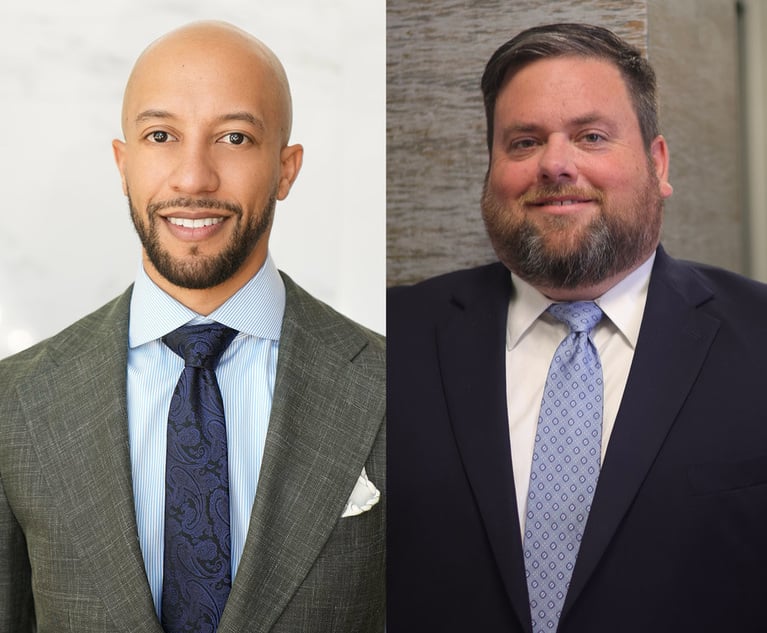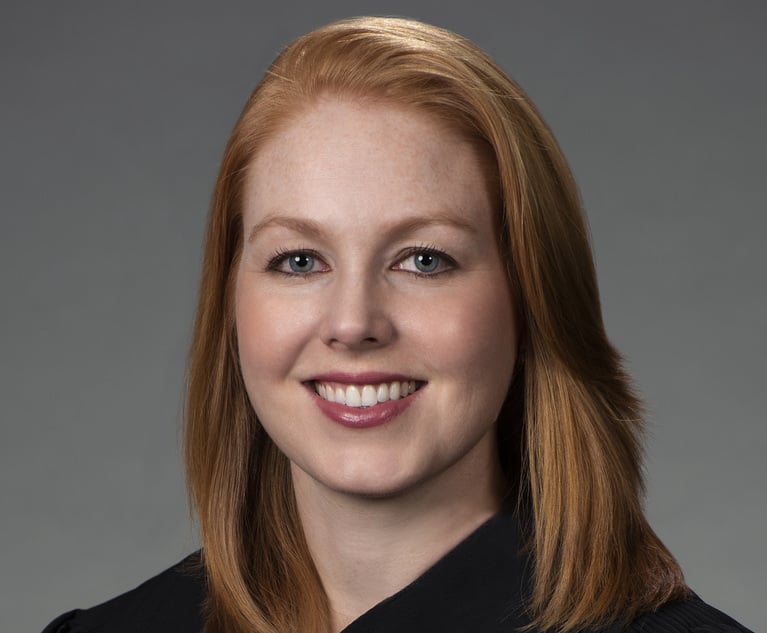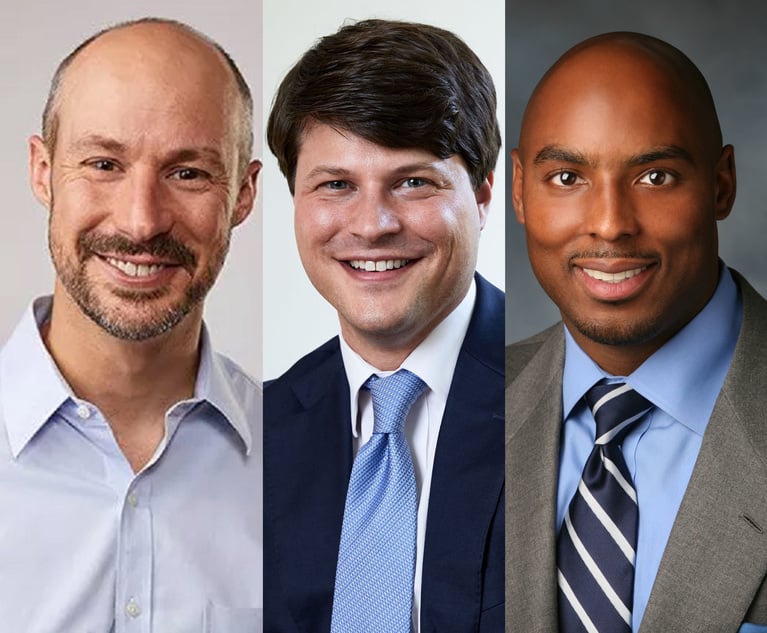Voter Lawyers Call Paper Ballots 'Reasonable, Prudent' for Midterm Election
Lawyers representing Georgia voters and a Colorado coalition agree they want a federal judge to force the Georgia secretary of state to return to paper ballots for the November election. But they disagree on how to do it.
August 21, 2018 at 02:27 PM
6 minute read
 Atlanta Attorney Bruce Brown (Photo: John Disney/ALM)
Atlanta Attorney Bruce Brown (Photo: John Disney/ALM)
Attorneys for Georgia voters suing to force the state to junk electronic voting and return to paper ballots are pushing back against the secretary of state's contention that doing so would plunge the November election into chaos.
Protestations by Secretary of State Brian Kemp that converting to paper ballots before early voting begins in October would be too hard, too expensive and could compromise the election “fundamentally mischaracterizes the reasonable, prudent and minimalist relief of polling place paper ballots,” Atlanta attorney Bruce Brown wrote in a pleading filed late Monday in federal court in Atlanta.
Brown, who is representing a national voter coalition urging a return to paper ballots to secure the validity of the nation's elections, said the state's largest ballot printer is “ready, willing and able” to provide as many as Georgia needs for 26 cents each. County poll workers are already trained to securely handle paper ballots for provisional voters, he said. If additional optical scanners are needed to tally ballots, used scanners are “widely available and can be purchased easily for reasonable amounts” with an additional $10.3 million in federal funds designated for election security that Georgia recently received.
Brown also continued to sound the alarm that the state's central election server was “fully accessible to any computer user with internet access” for months before and after the 2016 presidential election.
But the solution offered by Brown and co-counsel Cary Ichter of Atlanta's Ichter Davis; William Ney of Atlanta's Ney Hoffecker Peacock & Hayle; and Seattle attorney Robert A. McGuire differs from one offered by David Cross, an attorney at Morrison & Foerster in Washington, D.C., who represents several Georgia voters who are not members of the Colorado-based Coalition for Good Governance.
Cross argued in court papers Monday that the state should mail an absentee ballot and a prepaid return envelope to every registered voter prior to the November election.
“Georgia law already requires officials to make absentee ballots available to every voter,” Cross said. “As a result, the state and counties are already legally required to have procedures for printing, providing, collecting and counting those paper ballots. …They need only expand their existing procedures.”
But Brown contended that moving the state to all-absentee mail balloting “would require adoption of an entirely new statutory and regulatory regime.”
The case is assigned to U.S. District Judge Amy Totenberg.
At issue is the security of Georgia's antiquated electronic voting machines that have no paper audit trail. Last year, the Coalition for Good Governance joined with Georgia voters in a suit challenging the continued use of electronic voting machines they contend are woefully compromised and can be easily hacked.
In seeking an injunction to force a return to paper ballots, lawyers for the voters cited alarms raised by security officials, legislators and cyber security experts that Georgia's election infrastructure has already been targeted by Russian hackers.
Even Kemp, who is running for governor on the Republican ticket against Democrat Stacey Abrams, has acknowledged Georgia's voting machines should be replaced and has established a committee to recommend alternatives.
Kemp and his staff insist the state's elections system and voting equipment “remain secure.” The voters' lawyers dispute that, pointing to alarms raised by cyber-security experts who warned Kemp the state voter registration database, election software applications, password files, encryption keys and other confidential information were publicly accessible for months via Kennesaw State University's Center for Election Systems website.
KSU had a long-standing contract with the state to assist counties in administering state elections. Kemp's spokeswoman has said the contract was terminated in December and that cyber-experts only accessed “a misconfigured server” that contained public voter lists, training materials and historical voting data.
In Tuesday's filing, Brown contended the state has “three different, feasible, time-tested options” for counting ballots that are authorized by state statute. They include: scanning ballots in each polling place; scanning ballots in a central location in each county, which is currently done for mail and provisional ballots; or hand counting ballots.
Brown also asked the court to direct Kemp to audit paper ballot election results prior to certifying each race. He said funds are available through $380 million in federal grant monies available to Georgia and other states that may be used for post-election audits.
The lawyer also asked Totenberg to address the security of electronic pollbooks containing current lists of registered voters that are programmed by the secretary of state's staff for use by county election officials.
Brown wants the state to conduct an audit of the pollbook data before Oct. 1 to assure “that all changes made to voter records in the last three years were authorized and properly recorded” and that pollbook voter data “is consistent with the official voter registration data.”
Although Kemp's staff asserted the election system is secure because portions of it are “air gapped,” or not connected to the internet, Brown said, “As data changes from election to election, there must be a mechanism to update the ballot building system, likely a thumb drive or CD that was plugged into some other system that was connected to the internet. If an attacker gets malware onto these components, they can get malware into the air-gapped ballot building system.”
Brown also claimed Kemp's counsel has presented no evidence that it conducted a forensic examination to determine whether the state's election system was altered or latent malware installed when it was easily accessible through KSU's website “during the time period in which Russian operatives are alleged to have been probing for vulnerabilities in, and trying to manipulate, America's election systems.”
“Conducting an election using the same software that was stored on that server after that exposure, without first determining whether the server has been maliciously infiltrated, is reckless in the extreme,” he said.
This content has been archived. It is available through our partners, LexisNexis® and Bloomberg Law.
To view this content, please continue to their sites.
Not a Lexis Subscriber?
Subscribe Now
Not a Bloomberg Law Subscriber?
Subscribe Now
NOT FOR REPRINT
© 2025 ALM Global, LLC, All Rights Reserved. Request academic re-use from www.copyright.com. All other uses, submit a request to [email protected]. For more information visit Asset & Logo Licensing.
You Might Like
View All
Trial Court Had No Authority to Reopen Voir Dire After Jury Impaneled in Civil Case, State Appellate Court Rules

'Pushed Into Oncoming Traffic': $5.85M Settlement in Mediated Auto Tort
6 minute read
Justice Known for Asking 'Tough Questions' Resolves to Improve Civility
4 minute read
Trending Stories
- 1Relaxing Penalties on Discovery Noncompliance Allows Criminal Cases to Get Decided on Merit
- 2Reviewing Judge Merchan's Unconditional Discharge
- 3With New Civil Jury Selection Rule, Litigants Should Carefully Weigh Waiver Risks
- 4Young Lawyers Become Old(er) Lawyers
- 5Caught In the In Between: A Legal Roadmap for the Sandwich Generation
Who Got The Work
J. Brugh Lower of Gibbons has entered an appearance for industrial equipment supplier Devco Corporation in a pending trademark infringement lawsuit. The suit, accusing the defendant of selling knock-off Graco products, was filed Dec. 18 in New Jersey District Court by Rivkin Radler on behalf of Graco Inc. and Graco Minnesota. The case, assigned to U.S. District Judge Zahid N. Quraishi, is 3:24-cv-11294, Graco Inc. et al v. Devco Corporation.
Who Got The Work
Rebecca Maller-Stein and Kent A. Yalowitz of Arnold & Porter Kaye Scholer have entered their appearances for Hanaco Venture Capital and its executives, Lior Prosor and David Frankel, in a pending securities lawsuit. The action, filed on Dec. 24 in New York Southern District Court by Zell, Aron & Co. on behalf of Goldeneye Advisors, accuses the defendants of negligently and fraudulently managing the plaintiff's $1 million investment. The case, assigned to U.S. District Judge Vernon S. Broderick, is 1:24-cv-09918, Goldeneye Advisors, LLC v. Hanaco Venture Capital, Ltd. et al.
Who Got The Work
Attorneys from A&O Shearman has stepped in as defense counsel for Toronto-Dominion Bank and other defendants in a pending securities class action. The suit, filed Dec. 11 in New York Southern District Court by Bleichmar Fonti & Auld, accuses the defendants of concealing the bank's 'pervasive' deficiencies in regards to its compliance with the Bank Secrecy Act and the quality of its anti-money laundering controls. The case, assigned to U.S. District Judge Arun Subramanian, is 1:24-cv-09445, Gonzalez v. The Toronto-Dominion Bank et al.
Who Got The Work
Crown Castle International, a Pennsylvania company providing shared communications infrastructure, has turned to Luke D. Wolf of Gordon Rees Scully Mansukhani to fend off a pending breach-of-contract lawsuit. The court action, filed Nov. 25 in Michigan Eastern District Court by Hooper Hathaway PC on behalf of The Town Residences LLC, accuses Crown Castle of failing to transfer approximately $30,000 in utility payments from T-Mobile in breach of a roof-top lease and assignment agreement. The case, assigned to U.S. District Judge Susan K. Declercq, is 2:24-cv-13131, The Town Residences LLC v. T-Mobile US, Inc. et al.
Who Got The Work
Wilfred P. Coronato and Daniel M. Schwartz of McCarter & English have stepped in as defense counsel to Electrolux Home Products Inc. in a pending product liability lawsuit. The court action, filed Nov. 26 in New York Eastern District Court by Poulos Lopiccolo PC and Nagel Rice LLP on behalf of David Stern, alleges that the defendant's refrigerators’ drawers and shelving repeatedly break and fall apart within months after purchase. The case, assigned to U.S. District Judge Joan M. Azrack, is 2:24-cv-08204, Stern v. Electrolux Home Products, Inc.
Featured Firms
Law Offices of Gary Martin Hays & Associates, P.C.
(470) 294-1674
Law Offices of Mark E. Salomone
(857) 444-6468
Smith & Hassler
(713) 739-1250






